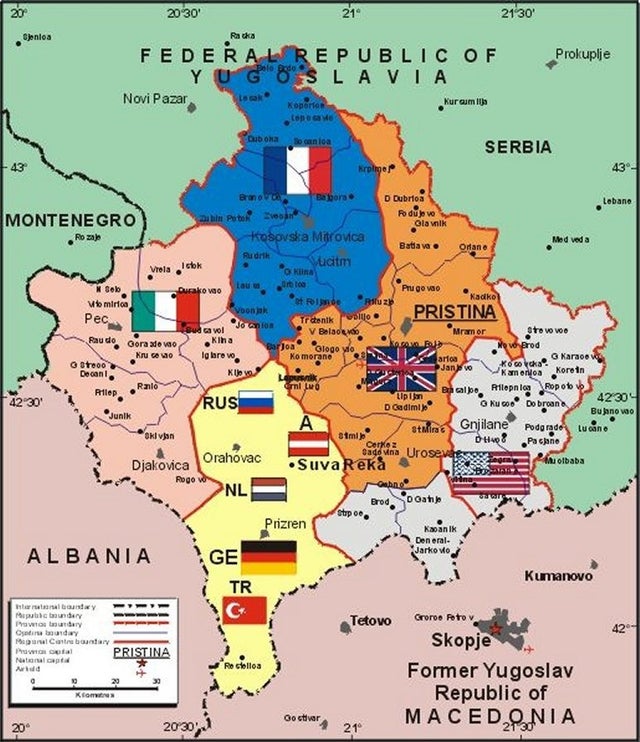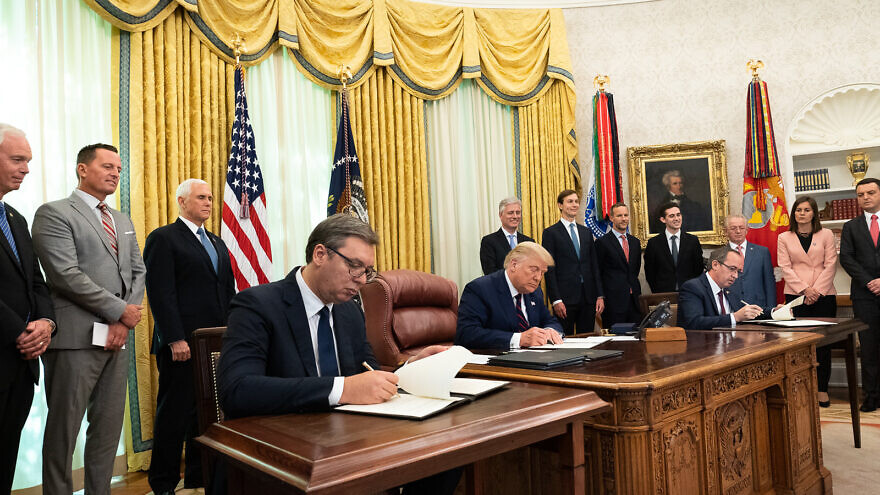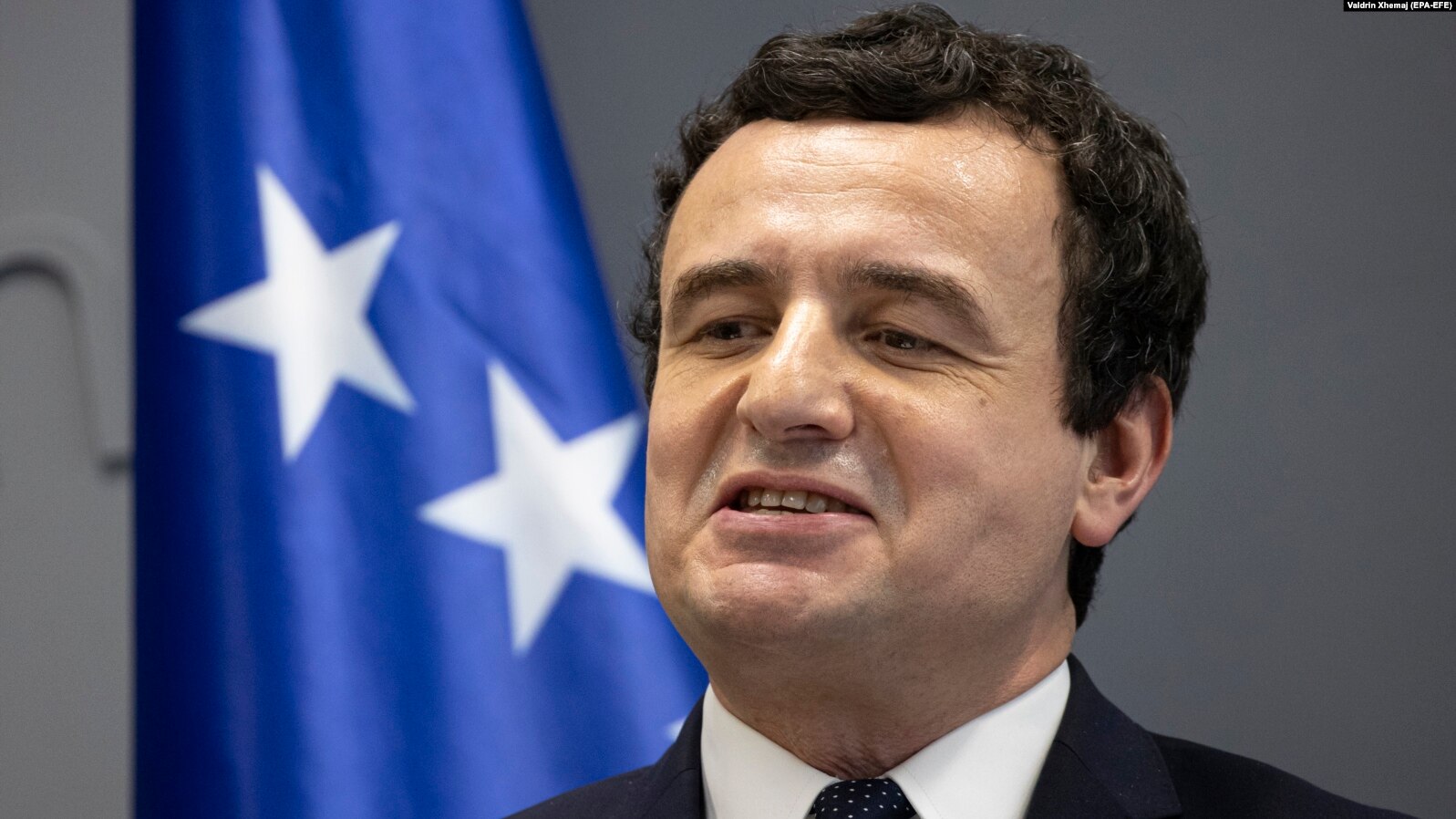Fighting Corruption in a Rentier State—The Case of Kosovo
By Josephine Mintel — February 2021
Rentier Statebuilding in Kosovo: the UN Dynamic and the Early Years of the Intervention

International Presence – KFOR 1999
The post-1999 peacebuilding mission in Kosovo has been one of the costliest international interventions to date. The budget for the United Nations Mission in Kosovo was approximately $150 million immediately after the war in 1999 and has averaged about $40 million annually since. Foreign aid and investments in Kosovo by the European Union and the United States have also been in the tens of millions of dollars during this time. Despite the astronomical expenditures by internationals to create a liberal democracy with a free-market economy, Kosovo still struggles with high poverty, weak public institutions, political instability, and high levels of corruption.
One salient explanation for this failure is that external cash inflows from the international presence have crippled domestic productivity and promoted the state’s “rent-seeking” behavior. This creates a ruinous cycle: there is a large foreign presence in Kosovo to help rebuild it, but that very presence perpetuates dependence on foreign income, inhibiting the growth and development of endogenous trade-based industries. Using macroeconomic data from 2006-2012, Kosovo’s reliance on external financial inflows and relative lack of exports can be discerned (despite reliability problems with this data) because the discrepancy is so large.
Thus, the political-economic “rentier state” theory accurately describes the Kosovo government’s current “rent-seeking” behavior which is a major source of the corruption that exists there. The creation of a kleptocratic and predatory state is likely when governments become focused on the immediate benefit of available rents from international sources for “peacebuilding” and eschew the development of internally generated wealth. In Kosovo, government elites have been credibly accused of corruption: Hashim Thaci, Kosovo’s first Prime Minister and until recently, its President, has been called one of the “biggest fish” in organized crime, according to a Western military intelligence report. Still, there have been little to no consequences for this from the International Community which provides the financing.
Fighting Corruption in a Rentier State: the US Dynamic in Kosovo in Recent Years
Two critical components must be addressed by the international community to target and dismantle rentier state dynamics: 1) large external sources of income should be coordinated, closely monitored using reliable data, and limited where appropriate, while endogenous sources of income are promoted and, 2) government corruption, a direct consequence of the rentier state, must be extirpated. Thus far, US efforts in Kosovo have failed on both counts.
In 2020, the Trump administration brokered an “economic normalization” treaty between Kosovo and Serbia. Despite this apparent prioritization of economic issues, the agreement is a failure in its terms and implementation. An explanation of why the US effort to promote economic normalization is failing can be developed using rentier state-building theory. Richard Grenell, Donald Trump’s Special Envoy for talks between Serbia and Kosovo, announced in June 2020 that the US and European Union (EU) had divided their tasks in the Serbia-Kosovo dialogue: the US would focus on economic issues and the EU on political issues. However, this division of labor contradicts the rentier theory’s assertion that any deal focused on economic issues without reference to resolving political disputes is unlikely to work. This is especially true in the Kosovo-Serbia dispute, as the issues are widely seen as stemming from political conflict.

Signing ceremony with Richard Grenell: The White House
The Grenell deal also has “constructive ambiguity” and vague implementation plans. It contains 16 “points,” principal among them restoring air and rail links between Kosovo and Serbia. However, to date, the flights between Belgrade and Prishtina have not begun, and some have also questioned the viability of these flights due to political barriers such as the uncertainty surrounding documents required for border crossings. In addition, renewing railway links to promote trade will be ineffective until a political settlement around the issue of tariffs is reached. Kosovo and Serbia also agreed to move their embassies to Jerusalem, and Israel agreed to recognize Kosovo as part of the Trump administration’s Middle East foreign policy strategy. However, Serbia’s President has since said that he will not move the Serbian embassy to Jerusalem if Israel recognizes Kosovo. Other significant negative repercussions on this issue are continuing to develop. An article in Balkan Insight argued that Kosovo’s decision to move the Kosovo Embassy to Jerusalem threatens to permanently damage its relations with the Arab and Muslim world and Turkish President Recep Tayyip Erdogan has asked Kosovo’s new prime minister to reconsider the move and close Kosovo’s recently opened Jerusalem embassy. There were no provisions in this agreement to improve economic data or evaluate the success of other terms. Considering that the Grenell deal failed to address underlying political issues, it is no surprise that the result has been characterized as a “nothing burger” and an ineffectual “economic normalization” deal.
While the Grenell Kosovo-Serbia deal has amounted to paper promises, US investment in Kosovo continues to flow freely, perpetuating the same type of external inflows rentier theory describes as crippling. Shortly after the Grenell agreement was signed, a delegation of the US International Development Finance Corporation (DFC) headed by CEO Adam Boehler met with the Kosovo Prime Minister in Prishtina. Boehler said that, based on the Grenell agreement, one billion dollars would be invested in Kosovo to “support economic prosperity and stability through private sector investment in the country.” This financial support is promised without any reference to the implementation of the deal. Contrary to rentier state theory’s warnings on the negative consequences of sizeable external cash inflows, the US is still pumping money into Kosovo without holding it accountable.
The US has continually enabled the kleptocratic elite in Kosovo, thereby perpetuating the deleterious effects of a rentier economy. In Kosovo’s 2019 parliamentary election, Albin Kurti, leader of Vetëvendosje [Self-Determination], won the largest share of the electorate. This ended a period of political domination by former leaders of the guerrilla Kosovo Liberation Army (KLA), many of whom have been accused of war crimes and corruption. However, in March 2020, Kurti fired Interior Minister Agim Veliu when Veliu proposed declaring a state of emergency due to the coronavirus pandemic. This declaration would have given the power back to the Kosovo Security Council chaired by the KLA’s former head, Hashim Thaci, severely limiting the newly elected Kurti’s power. In response, a no-confidence vote was filed against Kurti by Thaci’s party, and the motion was adopted. Richard Grenell was primarily responsible: the head of the coalition party that initiated the no-confidence vote said the reason for his party’s withdrawal of support for Kurti was his refusal to accede to Grenell’s demand that Kosovo lift tariffs against Serbia while receiving nothing in return. Thus, the US tacitly supported regime change in Kosovo that re-installed the kleptocratic elite. Contrary to the stated goals ostensibly followed by the United States, a democratically elected and popular leader (whose major political platform rested on anti-corruption measures) was ousted with active US participation.

Vice President Joe Biden and Hashim Thaci
While some may blame the Trump administration’s aberrant policies, this problem is endemic to US foreign policy in Kosovo since the end of the war. Many high-ranking US officials from Madeline Albright to Hillary Clinton have supported Thaci and his Democratic Party of Kosovo (LDK). This political party is the direct descendent of the thuggish KLA, a group that has been both paramilitary force and organized crime syndicate. Phillip Kosnett, the US ambassador to Kosovo in 2020 during the ousting of Albin Kurti and a career diplomat outside of Trump’s inner circle, also tweeted in support of the no-confidence vote. This US policy could also be perpetuated under the newly elected Biden administration: Joe Biden himself is quoted as calling Thaci “the George Washington of Kosovo” on the book jacket of Thaci’s biography. Thaci resigned in November 2020 to face war crimes charges in the Hague for his involvement with the KLA. Due to the no-confidence vote, Avdullah Hoti, Thaci’s close ally, became Kosovo’s Prime Minister directly before signing the Kosovo-Serbia deal promoted by Richard Grenell. Hoti received just eight percent of the vote in the October 2019 elections.
The US originally supported the KLA and its leaders because of their swift establishment of political control after the fighting ended in 1999. The KLA created provisional governance in 27 of the then 29 municipalities in Kosovo, creating obstacles for the United Nations Mission in Kosovo’s initial interim administration. A report by the International Crisis Group said: “a painless takeover, which might have been possible in mid-June without opposition, is no longer possible now that the UCK structures [KLA-run provisional government] have gained strength and confidence.” Continuing support of the political elite in Kosovo by the US is likely related to the pro-Western stance of Thaci and his party, including their accommodation of US military interests. For example, permission was granted to install Camp Bondsteel, the largest and most expensive military base built by the US in Europe since the Vietnam War. US support may also be related to inveterate habit. Over time, however, the Kosovo political elites have become more and more corrupt and internally unpopular. They continue to erect barriers to a political settlement with Serbia since they perceive that this may adversely affect their access to power and the generous international rents that are currently available. These developments have not been reflected in US policy towards Kosovo.
Recommendations for Revision to US-Kosovo Policy

Albin Kurti, Prime Minister of Kosovo
After yet another snap election in Kosovo on February 14, 2021, Albin Kurti’s Vetëvendosje overwhelmingly won the election again, running on an anti-corruption platform. While Kurti and his political party tend to use anti-Western rhetoric and echo Albanian populist sentiments, The Biden administration should work with Kurti to broker a comprehensive settlement with Serbia and support Kurti’s anti-corruption agenda in Kosovo. This only makes sense given Kurti’s immense democratic support in the recent Kosovo elections. Large sources of external funding from the US and US allies to Kosovo should be given more scrutiny; foreign aid from all sources should be coordinated to assure that incentives for corruption by government officials are minimized, and the aid should be targeted to promote internal economic growth and development. The US should attach clauses to foreign aid or investment based on Kosovo’s ability to reach benchmarks in implementing agreements made between Kosovo and Serbia or benchmarks relating to anti-corruption enforcement. Benchmarks should be based on reliable statistics and credible analyses from independent sources. Most importantly, the US and EU should team up again to tackle both the political and economic aspects of the Kosovo-Serbia dialogue, as these aspects cannot be fundamentally disentangled. A recommitment by the US and the EU to jointly facilitate a dialogue between Kurti’s government in Prishtina and Vucic’s government in Belgrade is fundamental to overcoming the most significant barrier to any economic or political settlement and lasting peace: mutual recognition.
This article was written as a part of my work with the University of Chicago Committee on International Relations. It was inspired by my reading of “Rentier Statebuilding in a Post-Conflict Economy: The Case of Kosovo,” Development and Change 47, no. 3 (May 2016): 517–41 by Nicolas Lemay-Hebert and Syed Mansoob Murshed.